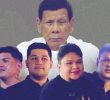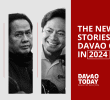In this third installment of Davao Today’s series of Q&As on the 2007 elections, Glenda Gloria, managing editor of Newsbreak magazine and one of the country’s most respected political journalists, explains why electoral reform (or the absence of it) is key in this election and beyond.
What is at stake in this election?
At stake are three strategic issues that will shape Philippine politics beyond 2010: charter change (which will most likely be pushed again by the Arroyo administration if they win the majority in the House); the future of party list-representation (following the distortion of the spirit of the law through the fielding of pro-government and resource-rich parties to neutralize marginalized sectors already represented in Congress); and electoral reforms (which, when not pushed — such as reforms in the Comelec and campaign financing — would cast doubt on the conduct of the 2010 presidential elections).
Some say the Arroyo administration is determined to dominate the elections to head off another possible impeachment and political turbulence. Any thoughts on this?
This is true for any Philippine administration passing through a mid-term exercise. An incumbent president would prefer to spend his/her last years in office with legislators and local executives who share his/her goals and who will protect his/her interests once his/her term ends. For this reason, the Arroyo administration is determined to dominate these races. But, of course, the bigger reason is the fear of a third impeachment try on the President. The other unstated reason is that once she is able to dominate the House and the Senate, the President thinks she would have earned enough political capital that she can use to negotiate with whoever will run (and win) in the presidential 2010 elections (assuming the 2010 elections will push through).
There is also the sense that local political groups or politicians are exploiting the administration’s desperation. They do this by getting political concessions from the administration which they would then use to beef up their own political domains. Any thoughts?
The way I will put this is that both have been exploiting each other since the “Hello, Garci” scandal, when the President realized that her source of power is the locals. Thus, the locals have been getting concessions from this government since then. That’s why they were able to prepare their fiefdoms for these elections; just look at the Ampatuans (of Maguindanao).
What are the issues do you think should be on the table during the campaign but are not being discussed?
The nitty-gritty of campaign financing is hardly discussed or debated. The measure of a candidate’s campaign spending has been reduced to counting how many TV and radio ads he has aired. Which is just half of the story. A lot of money is being used on other campaign expenses. The question is, where is this money coming from?
What do you think is the administration’s strongest points, and the opposition’s?
The administration has mastered the oldest election tricks in the world. It has access to almost-unlimited funds. The opposition slate’s strength is that it has several valid issues against the administration.
What would swing the polls? The middle class? The Left? The Right?
What always swings the polls are two blocs: the bloc of cheating operators and the bloc of election watchdogs operating in perennial “hot spots” (read: cheating spots). If the latter works hard, then the cheats would be out of business. And the votes will be finally counted right. I still wish for that day to come.
Finally, what is your sense of how Filipinos regard or appreciate the elections? Is this something important to them? Do they even care? Or have they become jaded?
Unless genuine election reforms (reforming the Comelec, making campaign financing more transparent, etc.) are put in place in the coming years, more and more Filipinos will grow more cynical toward the electoral process. Elections remain important to Filipinos. We are a patient lot. But if things continue to worsen and the electoral process continues to be prostituted, we might just find ourselves one day giving up on it. (davaotoday.com)
Historian Manuel Quezon III and political analyst Luis V. Teodoro answered these same questions in the first and second installments, respectively, of this series.
***************
Copyright � 2007 Davao Today. Permission is granted to use and distribute this article, provided that any byline, tagline and the link URL to davaotoday.com are retained. Visit Davao Today for more stories on Davao City, Mindanao, Manila and the rest of the Philippines.
***************










